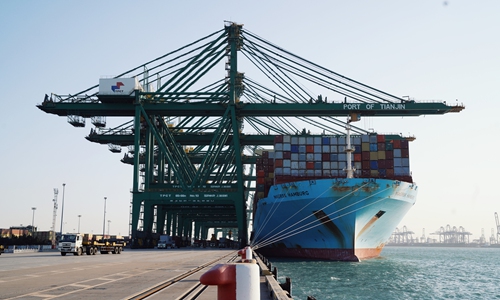Port of Tianjin sets new record, ensures supplies for Winter Olympics despite Omicron

The Maersk Hamburg container ship Photo: Courtesy of Tianjin Port Group
The Port of Tianjin, one of the major ports in North China, set a global record for berth productivity for major international shipping lines, and despite the Omicron outbreak in the municipality, it has maintained normal operations, ensuring supplies for the upcoming 2022 Beijing Olympic and Paralympic Winter Games, the port's authority said on Sunday.
Analysts said that ports in China have implemented the most flexible and scientific measures across the globe, which have ensured effective epidemic prevention and control at domestic ports without delaying normal operations and interrupting the global supply chain.
The Port of Tianjin achieved a new global record for berth time efficiency among the three Mediterranean lines belonging to the major international shipping alliance - 2M Alliance, Tianjin Port Group told the Global Times on Sunday.
On Saturday, a Maersk Hamburg containership sailing smoothly from Tianjin Port Pacific International Container Terminal at 8 pm, 24 hours earlier than the originally scheduled time, according to a statement sent to the Global Times by Tianjin Port Group.
A total of 9,066 containers were handled by the terminal within only 34.6 hours, with berth productivity reaching 262 containers per hour for the ship, the highest productivity record of the 2M-AM3 Service, said Maersk.
The port has been operating in a stable manner despite the impact of recent cases of the Omicron variant, a media relations representative at Tianjin Port Group told the Global Times.
Tianjin reported 55 new confirmed COVID-19 cases from Saturday to Sunday.
Port of Tianjin said that it will continue to fully ensure supplies for the Beijing Winter Olympics, necessities for guaranteeing people's livelihood, and the smooth flow of the supply and industry chains in regions, including the Beijing-Tianjin-Hebei Region.
On Saturday, six broadcast vehicles from Spain that are to be used during the Beijing Winter Olympics were successfully unloaded at the port. They belong to the Olympic Broadcasting Services and will be transported to venues in Zhangjiakou in Hebei Province and Yanqing district in Beijing, the port said.
Wu Minghua, a Shanghai-based veteran shipping industry analyst, told the Global Times on Sunday that in case of an outbreak at a domestic port, the port would usually undertake prompt inspection, disinfection and quarantine of relevant personnel, while unaffected employees take over the shifts without delaying the normal loading and unloading of goods at the port.
Wu said that logistics can also be undertaken by the nearest port in a timely manner, without extensive and prolonged delays.
With the high degree of mechanization of the container ports, direct personnel contact is relatively limited, and major supply chain disruptions caused by outbreaks at container ports are unlikely, Wu noted.
"Ports in China have never been affected by the COVID-19 pandemic on a large scale that caused a significant delay in transportation. That's compared with some foreign ports, which have seen staffing by dock workers falling to even 50 percent, resulting in cargo blockages and interruption of the global supply chain," Wu said.
From January 1 to 10, the port saw arrivals of 363 freight vessels, a year-on-year increase of more than 15 percent, the Xinhua News Agency reported on Saturday, adding that more than 215,000 vehicles are operating through the port area to provide logistics support, up more than 4 percent compared with 2021.



